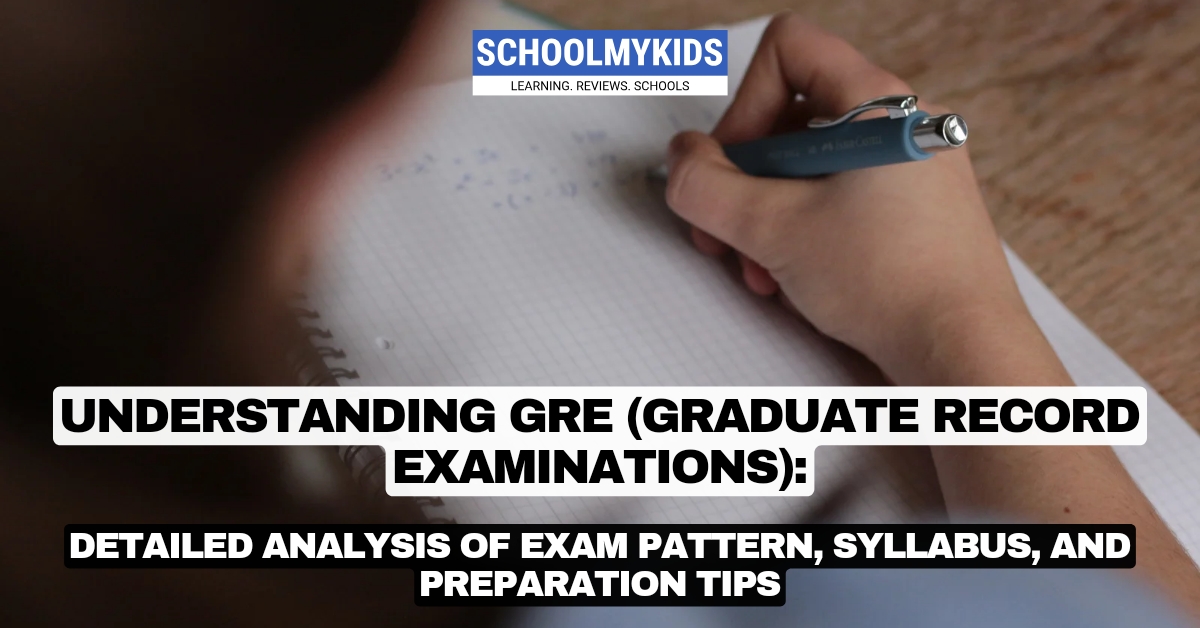The Graduate Record Examinations (GRE) is a standardized test that is an admissions requirement for many graduate schools in the United States and other countries. This article provides a comprehensive overview of the GRE exam pattern, detailed syllabus, essential preparation tips, and resources for effective study.
Overview of GRE Exam
Purpose of GRE: The GRE is designed to measure the verbal reasoning, quantitative reasoning, analytical writing, and critical thinking skills of candidates aspiring to pursue graduate and professional programs.
Importance of Understanding the Exam Pattern: Understanding the GRE exam pattern helps candidates plan their preparation strategically, manage time efficiently during the test, and enhance their chances of securing a high score.
GRE Exam Pattern
Exam Mode:
- The GRE is conducted in both computer-based and paper-based formats.
Subjects:
- The exam comprises three main sections: Verbal Reasoning, Quantitative Reasoning, and Analytical Writing.
Type of Questions:
- The question paper includes Multiple Choice Questions (MCQs), numeric entry questions, and essay prompts.
Medium of Exam:
- The exam is conducted in English.
Duration of Exam:
- The total duration of the computer-based GRE is 3 hours 45 minutes. The paper-based GRE has slightly different timings.
Total Marks:
- Verbal Reasoning and Quantitative Reasoning are each scored on a scale of 130-170, and Analytical Writing is scored on a scale of 0-6.
Marking Scheme:
- There is no negative marking for incorrect answers in the Verbal and Quantitative sections.
GRE Detailed Question Paper Design
Example of GRE Question Distribution:
| Section | Number of Questions | Duration (minutes) | Total Marks |
|---|---|---|---|
| Analytical Writing | 2 tasks | 60 | 0-6 |
| Verbal Reasoning | 40 (20 per section) | 60 (30 per section) | 130-170 |
| Quantitative Reasoning | 40 (20 per section) | 70 (35 per section) | 130-170 |
| Unscored/Research | Varies | Varies | Varies |
| Total | 82 | 225 | 340 |
Detailed GRE Syllabus
Verbal Reasoning:
- Reading Comprehension
- Text Completion
- Sentence Equivalence
Quantitative Reasoning:
- Arithmetic
- Algebra
- Geometry
- Data Analysis
Analytical Writing:
- Analyze an Issue
- Analyze an Argument
Preparation Strategy
Understanding the Exam Pattern:
- Familiarize yourself with the exam structure, marking scheme, and question distribution to plan your preparation effectively.
Focus on Fundamentals:
- Strengthen your basics in Verbal Reasoning, Quantitative Reasoning, and Analytical Writing.
Practice Previous Years’ Papers:
- Solve previous years’ question papers to understand the exam trend and difficulty level. This helps in identifying important topics and improving time management.
Take Mock Tests:
- Regularly take mock tests to simulate the exam environment, assess your preparation level, and identify areas that need improvement.
Effective Time Management:
- Allocate specific time slots for each section and stick to the schedule. Practice time-bound solving to enhance speed and accuracy.
Recommended Resources
Free Study Materials:
- The Official Guide to the GRE General Test by ETS
- GRE practice papers and sample questions available on the ETS website
- Khan Academy (offers free resources for GRE preparation)
YouTube Channels:
- Khan Academy: Offers comprehensive video lessons and practice exercises.
- Magoosh GRE: Provides detailed explanations and strategies for tackling different sections of the GRE.
- Manhattan Prep GRE: Features expert-led sessions and problem-solving tutorials.
Conclusion
Preparation Strategy:
- Understanding the exam pattern, focusing on fundamentals, practicing previous years’ papers, and taking regular mock tests are key to excelling in the GRE.
Resources:
- Utilize free study materials and educational YouTube channels to strengthen your preparation.
FAQs
Common Queries about GRE:
Q: What type of questions are asked in the GRE?
A: The GRE comprises Multiple Choice Questions (MCQs), numeric entry questions, and essay prompts, which test the candidate’s knowledge in Verbal Reasoning, Quantitative Reasoning, and Analytical Writing.
Q: What is the marking scheme of the GRE?
A: Verbal Reasoning and Quantitative Reasoning are each scored on a scale of 130-170, and Analytical Writing is scored on a scale of 0-6. There is no negative marking for incorrect answers in the Verbal and Quantitative sections.
Q: How important is the syllabus for the GRE?
A: The GRE syllabus forms the core of the Verbal Reasoning, Quantitative Reasoning, and Analytical Writing sections. Thorough understanding and revision of the syllabus are crucial for scoring well in the exam.
Q: Are there any limits on the number of attempts for the GRE?
A: Candidates can take the GRE once every 21 days, up to five times within any continuous rolling 12-month period.
Q: How can I manage time effectively during the GRE exam?
A: Practice time-bound solving of previous years’ papers and take regular mock tests to enhance your speed and accuracy. Allocate specific time slots for each section and stick to the schedule during the exam.








Be the first one to comment on this story.